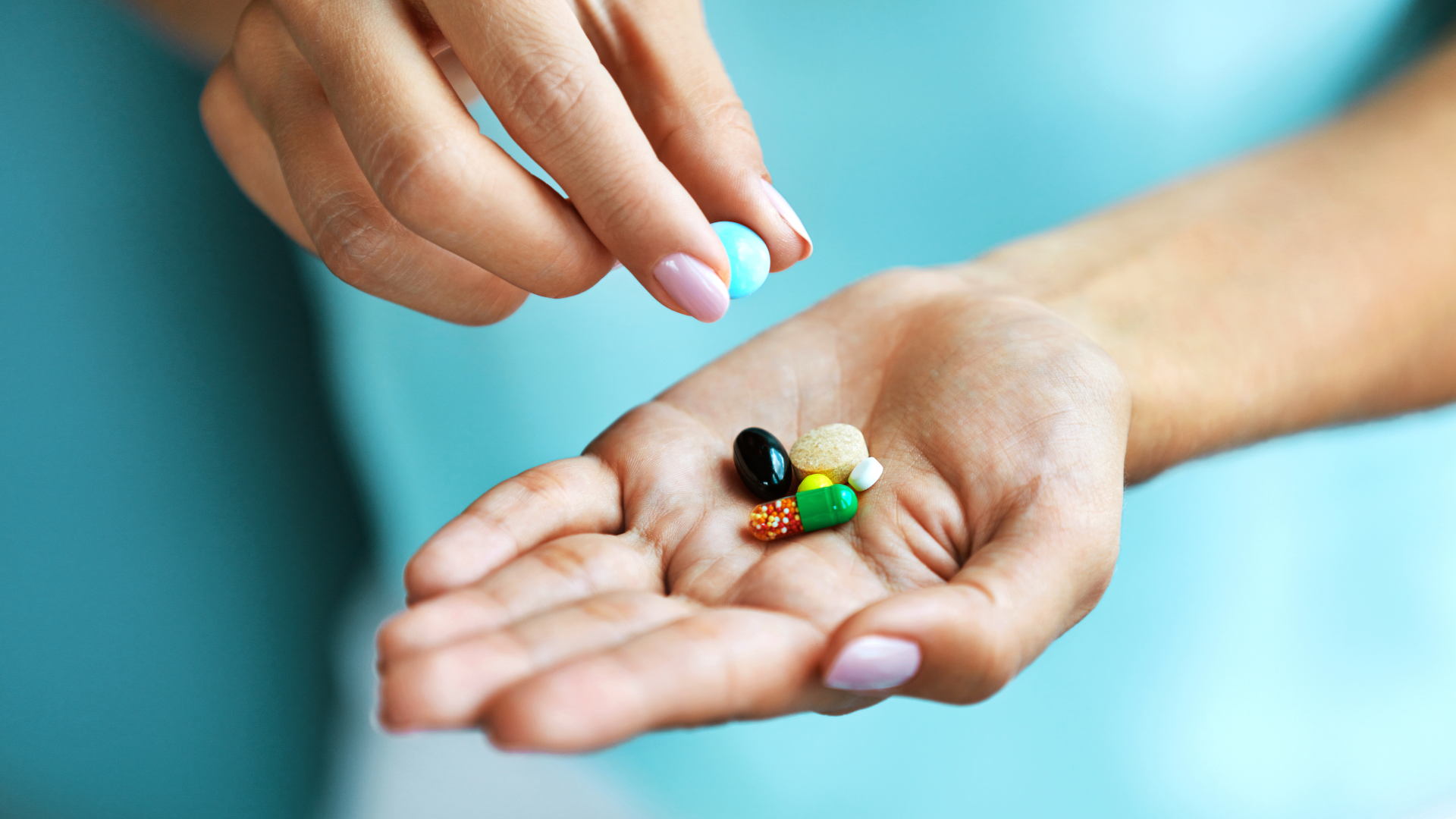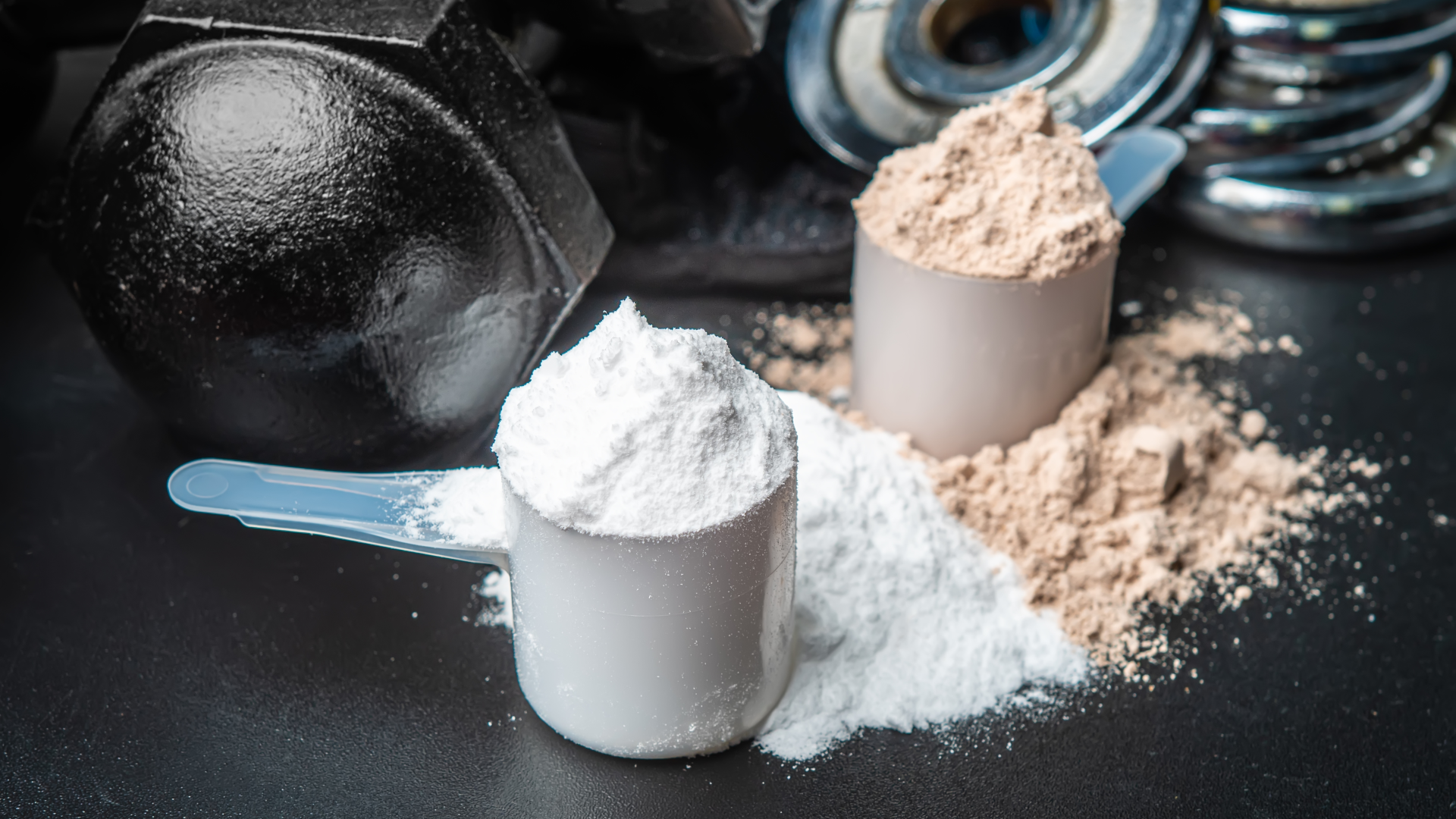Grab your cheat sheet |
Creatine isn’t exactly the new kid on the block in the workout supplement space. In fact, it’s been around for a long time and was actually discovered back in the 1800s.
But, it wasn’t until the 1970s that it was studied as an ergogenic aid for athletes, leading to regular use in the 1990s where creatine supplementation hit the elite athlete scene.
With research backing its proficiency at increasing both muscle strength and exercise performance, it became a best kept secret for those looking to push their athletic performance to new heights without the brutal recovery.
Today, creatine is one of the go-to dietary supplements for men and women who want to smash their workout goals, get the most out of high intensity interval training, and feel fresh and focused in the process.
Let’s take a look at creatine, including the truth about the benefits, the side effects, and how safe it is for women to take.
What is creatine powder?
In simple terms, creatine powder is a dietary supplement often used by athletes or everyday gym goers who take part in strength training and high intensity interval training.
It's a naturally occurring molecule or amino acid found in human muscle cells as well as foods like meat and fish. It plays a crucial role in providing energy for contractions by increasing muscle creatine stores.
Creatine works by boosting the production of adenosine triphosphate (ATP) which occurs as the dominant source of energy for muscle contraction during movement.
During high intensity exercise, ATP gets used up fast and fatigue sets in. Creatine replenishes ATP levels and increases its availability. The result? Your muscles producing energy in a far more streamlined and efficient manner.
Generally, people take creatine to help regulate their body weight, increase their lean muscle mass, and enhance their exercise performance. As mentioned, taking creatine supplements also improves recovery times.
How do you take creatine?
You’ve probably seen people sipping on shakes in the gym and there’s a good chance they contain creatine. This form of sports nutrition comes in the form of a powder which is usually dissolved into other liquids or blended in a premixed product our Ultimate CRN-5 supplement.
FYI: The standard dietary creatine intake is recommended as three to five grams per day, based on your specific body weight.
Are creatine and creatine monohydrate the same?
Have you heard of ‘creatine monohydrate’ and wondered if it was the same as creatine? The answer is yes—they are pretty much the same thing.
Creatine is the naturally occurring compound found in both animal and human muscle cells. Creatine monohydrate is a form of creatine supplement with a water molecule added alongside the creatine molecule. This variation of creatine is easily absorbed into the body for enhanced performance and muscle gain.
What are the physical benefits of creatine?
According to droves of scientific evidence, there are several benefits of creatine. Let's take a look at them now.
Increased muscle strength and athletic ability
There's a proven link between creatine and enhanced performance during explosive short-duration, high intensity activities like sprinting and weightlifting.
Most athletes and fitness enthusiasts confirm that the effect of creatine in terms of performance is elevated strength and power—a pretty potent combination.
More muscle mass
Scientific studies show that creatine has the potential to increase muscle volume and promote muscle growth. In one particular clinical trial, creatine proved to be an ergogenic aid (an external influence that improves sporting performance as well as muscle mass).

The study group given creatine supplements boosted their body mass by 2kg over the placebo or control groups after a set period of training, showing that gains are a key benefit when taking regularly taking the supplement.
Weight loss and creatine
Some studies suggest that creatine may be associated with weight loss, but it doesn’t directly affect energy expenditure or fat metabolism.
Instead, creatine supplementation may increase the participants' overall training volume and intensity which, in turn, contributes to weight loss. Creatine may also help with weight management as it reduces muscle damage as well as soreness, speeding up the recovery period between workouts.
What are the mental health benefits of creatine?
As we know, creatine offers a treasure trove of benefits when it comes to athletic performance. But what about the health benefits?
Well, it turns out that creatine is quite an all rounder when it comes to improving overall health in men and women.
Brain function
A mix of controlled trials suggest that creatine administration can improve brain function when it comes to reasoning and short-term memory.
But while this is the case, we need a little more understanding of the cognitive effects of creatine to paint a fuller picture. We need more research to fully understand concepts including attention span, long-term memory, and partial memory.
Neurodegenerative treatment
Creatine supplementation has shown some potential in the treatment of some neurological disorders including as Huntington’s Disease and Alzheimer’s.
Are there any side effects?
Studies show that creatine monohydrate is totally safe to ingest with only a few recorded side effects. Chances are you wouldn’t experience any and naturally, it’s all down to the individual and their response to the supplement.
The main side effects of creatine
According to Healthline, some side effects include stomach cramping, bloating, and diarrhoea. If these effects rear their ugly head, reducing your intake or taking a short creatine break will tackle the issue.
It's important to note that people with pre-existing renal problems, diabetes or on blood sugar supplements shouldn't take creatine as it can lead to kidney damage in rare cases.

In some cases, taking creatine can result in weight gain, but this is mainly due to water retention. That said, weight gain can also be considered to be a benefit (depending on the individual) due to an improvement in physical performance and an increase in muscle mass.
Note: If you’re breastfeeding or pregnant, you should hold off on your creatine journey for now.
Is creatine worth the risk?
Hailed by many top athletes as an essential performance-boosting supplement and clinically proven by many extensive scientific studies—we’d say that creatine is definitely worth the risk.
After all, there's only minimal risk to a small population of specific individuals and a large gain to be had for everyone else.
Creatine and women
Let’s discuss whether women should take creatine, how much creatine a woman should take and of course, the creatine benefits for women.
Is creatine safe for women?
While there are many myths that suggest creatine is a male-only supplement or that it’s dangerous for women, but that isn’t the case at all.
Active women the world over use this supplement to smash their targets, improve their strength, and nail their recovery times, daily.
There's no concrete evidence that creatine isn’t safe for women, aside from those with kidney issues as well the under-studied groups of breastfeeding mothers and pregnant women.
Interestingly, creatine monohydrate is sourced from Germany and made without soy, dairy, or animal ingredients, so it's vegan friendly, too.
Beneficial health effects for women taking creatine
If your concerns stopping you from starting you on your creatine journey, why not join all the strong women out there pushing for optimum results from their workouts and see just what you and your body can achieve?
Creatine's different impact on men and women
The truth is, creatine supplementation can lead to similar results in men and women: improved power, strength and exercise performance.
But, women have different hormonal profiles to men and this can influence a woman’s response to creatine supplementation.

Some research shows that women receive a smaller increase in muscle creatine levels than men. But in a general sense, creatine isn't more effective for men than women.
As men have higher levels of muscle mass, the obvious increase in size may be more obvious in men, but not necessarily better.
What does creatine do for women?
While it's often known as a bulking supplement, creatine doesn't have a direct muscle weight boosting effect on women. If you want gains, the best way to bulk up is by using a combination of protein powder, strength training, and diet.
Interestingly, studies from propellolife show that women who took creatine supplements actually experienced an increase in lean muscle mass compared to those who didn’t take the same supplements over the same period.
So, those worries about building excess muscle are unfounded—creatine supplementation aids in lean muscle mass rather than bulk—so you can be toned, lean, and have the strength to match.
Related: High protein lunch ideas
Can women take creatine? What are the side effects?
Women may experience similar side effects to men when taking creatine including bloating, water retention, andgastrointestinal issues.
But, these side effects are generally mild and temporary—and most women do not experience them.
What does creatine do to a woman's body?
Creatine affects a woman’s body by increasing the concentration of phosphocreatine in the muscles. This, in turn, leads to improved energy production as well as faster recovery.
Creatine saturation gets to work on the outside of the body as well as the inside, offering a wealth of positive physical, psychological, and physiological benefits.
Creatine and Weight Gain
The idea that creatine supplements result in weight gain often put women off trying them.
But, the important difference to note is that creatine supplements do not increase fat levels in a women's body. In fact, creatine is calorie free. Instead, if you take creatine, your muscles will store more water which on the scales equates to weight gain. In simple terms, it's just water retention.

Assume that water retention will happen if you choose to start supplementation as it will help to manage your expectations. But, if you're in a sport like weight lifting that requires a specific body weight—you should treat creatine consumption with caution.
What are the benefits of creatine for women?
We’re happy to tell you that there are plenty of benefits with the use of creatine supplements for women. Let's explore.
Positive effects on mood and cognition
It was found in one study that creatine supplementation may have positive effects on the cognition and mood of women, potentially due to homeostasis and the restoration of brain energy levels.
This hints at creatine supplements being beneficial to women during postpartum as well as post-menopause.
Increase in skeletal muscle size and function
The same research also confirmed that creatine supplementation alongside resistance training results in encouraging effects on skeletal muscle size and function within postmenopausal women.
Positive impacts on bone health
Definitive studies have discovered that creatine supplementation in women may positively impact bone health and density due to the increased creation of osteoblasts (cells that build bone). Exciting results considering women are at higher risk of osteoporosis.
Should women take creatine?
If you're looking to really smash your workout targets, boost your strength, gain lean muscle mass, and recover like the elite—you should give it a try. And, guess what? Creatine supplementation for women is standard procedure with female athletes.
The question really lies in what your overall health is like, what your individual fitness goals are, and whether creatine is suitable for you. Consider your own personal circumstances and if you're a little ensure, talk to a healthcare professional.
Is creatine good for weight loss in women?
Creatine isn’t specifically used in products for weight loss. But, it can help you achieve weight loss goals by improving your exercise performance, helping you burn more calories in the process.

We don’t believe there's a quick fix for weight loss. So, don’t rely on any one product to get you where you want to be. For the healthiest results, combine your supplements with a balanced diet, consistent exercise, and good lifestyle choices. If you nail these areas, the weight loss will follow.
Should I take creatine while trying to lose belly fat?
No powder, supplement or product can specifically target one area of the body for weight loss. But, by improving your overall performance and tapping into a solid muscle building routine, you can use creatine to help with your overall fat loss goals.
Add a regular belly fat workout at home or at the gym and you will tackle that stubborn belly fat like a complete pro.
Is creatine different for women?
Good question. Many people assume that women’s and men’s creatine powder formulations are different due to their different physiologies. But, that's simply not true: creatine is exactly the same for women and men.
How much creatine should women take?
If you’re thinking about beginning your creatine journey, you’ll be wondering how much creatine a beginner woman should take.
Here's the thing: the dosage recommendations for creatine powder are based not on gender, but on body weight.
So, don’t go taking the same amount as your ripped male friend who swears by it. You need to calculate which quantities are best for you and your body.
The Loading Phase
It’s suggested by professionals that women to take around 20 grams of creatine per day. These are divided into smaller doses around four to five times a day over a recommended five to seven day period.
Maintenance doses
Next, a regular maintenance dose of three to five grams of creatine a day is recommended. This dosage will keep your creatine levels at a consistent high.
FYI: These are general guidelines and don’t apply to every individual.
Should women take creatine after a workout?
It actually isn’t too important when you take your creatine powder due to variations in individual response. The key is consistency and dosage. But, many people take theirs during the post-workout window.

Doing so means the muscles are primed for nutrient uptake, which can lead to better levels of creatine absorption.Some also take it with their meals to help maximise absorption.
Crazy Nutrition’s CRN-5 creatine formula, for example, advises you take the supplement 30 minutes before a workout to enjoy maximum muscle-boosting benefits.
How long does it take for a woman to see results from creatine?
There is no definitive answer to this question as specific results depends on the individual entirely.
Some women might find they see as well as feel a performance in muscle strength and performance within only a few weeks.For others, they may see the benefits after a few months.
Whoever you are or whatever your goals. consistency with both your supplementation and exercise will give you the best results.
Does creatine increase testosterone in females?
Perhaps due to the false narrative that creatine bulks up women, many think that a creatine supplement might either include testosterone or cause a rise in women’s testosterone levels.
Neither is the case. Creatine doesn’t have a direct impact on hormone levels in women and your testosterone levels won’t shoot up if you take it—it's exercise that increases testosterone, not creatine.
Can creatine affect female fertility?
There's limited research out there on the link between creatine and female fertility.
Some studies suggest that perturbations in creatine metabolism could be linked to reduced fertility and poor pregnancy outcomes—but the research is far from conclusive at this point.
Creatine is generally considered safe and isn’t known to have harmful effects on men’s or women’s fertility.
Always discuss your fertility questions with a healthcare professional who can give you up to date information on the subject if you are concerned.
When should girls take creatine?
There's no set age requirement for girls to start on creatine powder or recommended age. Really, it’s a matter of debate, with researchers proposing different strategies.
While we know that creatine is often used by athletes and has ergogenic benefits, these results won't necessarily be the same for growing adolescent girls.
As always, we recommend that girls and their parents check with healthcare professionals for an informed, qualified opinion on the subjects.
Women and creatine consumption: final thoughts
Now you know all about creatine and its benefits for women, you might be interested in trying some for yourself. So, what creatine supplements for women are recommended?
Whether you’re training for a bikini competition, you plan to get shredded for the holidays or you just want to see what your body can do, try Crazy Nutrition’s CRN-5 creatine formula.
The CRN-5 formula is specifically designed with high quality ingredients and contains a premium blend of minerals for a great flavour and even greater workouts.
It's also bursting with electrolytes to keep your body and muscles hydrated so you can lift harder, recover faster, and intensify your athletic performance. There are also different flavors to choose from to fit your taste.
Like it zesty? Choose lemon & lime flavor. Prefer it tropical? Orange & mango could be the one. If you follow the recommended daily dosages for your body, you’ll benefit the best kept creatine secret of the pros in no time.


